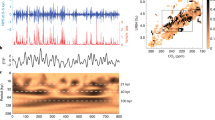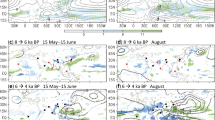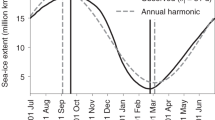Abstract
At least part of the record of climate change during the past million years may be attributed to forcing by changes in the geometry of the Earth's orbital system. Several attempts have been made to model the record of climate change (usually represented by the record of global ice volumes as recorded in marine sediments) using astronomical forcing1,2. These models have, in general, concentrated on the direct response of the ice sheets to changes in solar insolation resulting from orbital variations. So far no fully successful simulation of the climate record has been made. We investigate here the operation of a model which is forced simultaneously by changes in the distribution of solar insolation caused by orbital variations and by changes in the atmospheric carbon dioxide (CO2) concentration which are themselves forced by orbital parameters. The model results show the potential importance of other components in the climate system and their associated response to changing orbital parameters.
This is a preview of subscription content, access via your institution
Access options
Subscribe to this journal
Receive 51 print issues and online access
$199.00 per year
only $3.90 per issue
Buy this article
- Purchase on Springer Link
- Instant access to full article PDF
Prices may be subject to local taxes which are calculated during checkout
Similar content being viewed by others
References
Birchfield, G. E., Weertman, J. & Lunde, A. T. Quart. Res. 15, 126–142 (1981).
Pollard, D. J. geophys. Res. 88, 7705–7718 (1983).
Hays, J. D., Imbrie, J. & Shackleton, N. J. Science 194, 1121–1132 (1976).
Broecker, W. S. & vanDonk, J. Rev. Geophys. Space Phys. 8, 169 (1970).
Mesolella, K. J., Mathews, R. K., Broecker, W. S. & Thurber, D. L. J. Geol. 77, 250, (1969).
Milankovitch, M. Handbuch der Klimatologie Vol. 1A (Bornträger, Berlin, 1930).
Berger, A. J. atmos. Sci. 35, 2362–2367 (1978).
Imbrie, J. & Imbrie, J. Z. Science 207, 943 (1980).
Weertman, J. Nature 261, 17–20 (1976).
Shackelton, N. J., Hall, M. A., Line, J. & Shuxi, C. Nature 306, 319–322 (1983).
Broecker, W. S. Milankovitch and Climate (eds Berger, A. L. et al.) 687 (Reidel, Dordrecht, 1984).
Delmas, R. J., Ascencio, J.-M. & Legrand, M. Nature 284, 155–157 (1980).
Neftel, A., Oeschger, H., Schwander, J., Stauffer, B. & Zumbrunn, R. Nature 295, 220–223 (1982).
Broecker, W. S. Prog. Oceanogr. 112, 151 (1982).
Shackleton, N. J. & Pisias, N. G. Am. Geophys. Un. Chapman Conf. on CO 2 (in the press).
Author information
Authors and Affiliations
Rights and permissions
About this article
Cite this article
Pisias, N., Shackleton, N. Modelling the global climate response to orbital forcing and atmospheric carbon dioxide changes. Nature 310, 757–759 (1984). https://doi.org/10.1038/310757a0
Received:
Accepted:
Issue Date:
DOI: https://doi.org/10.1038/310757a0
This article is cited by
-
Reconstruction of atmospheric CO2 from ice-core data and the deep-sea record of ontong Java plateau: the Milankovitch chron
Geologische Rundschau (1996)
-
Climate change scenarios: Comparisons of paleoreconstructions with recent temperature changes
Climatic Change (1995)
-
The ice-core record: climate sensitivity and future greenhouse warming
Nature (1990)
-
A first approach to assessing future climate states in the UK over very long timescales: Input to studies of the integrity of radioactive waste repositories
Climatic Change (1990)
Comments
By submitting a comment you agree to abide by our Terms and Community Guidelines. If you find something abusive or that does not comply with our terms or guidelines please flag it as inappropriate.



